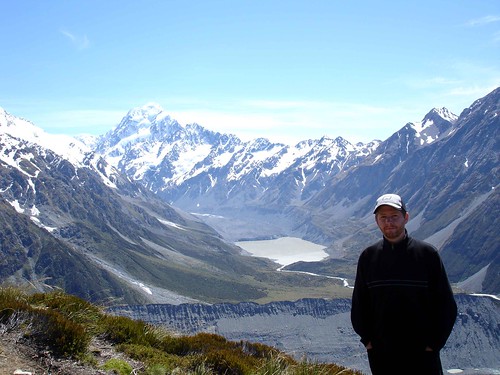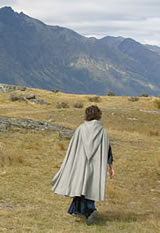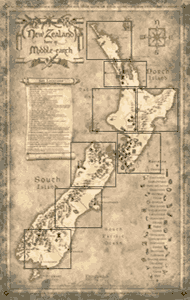Hello again. We’ve ventured from Mount Cook towards the South, and have now established a new base of operations at Glenorchy, northwest of Queenstown. (For those of you keeping score, we passed the Pelennor Fields, the Misty Mountains and the site of the Argonath on the way here, and Amon Hen, Ithilien, Isengard, and the entrance to Lothlorien are all nearby.) For this leg of the journey, we’ll hopefully be getting in some jet-boating, canyon-swinging and/or bungee-jumping to go along with the hiking and trout-fishing, before we head off for the Milford Track later in the week. Hope all goes well in your respective corners of the world.
Category: World at Large
Kofi’s Parting Shot.
“As [Harry] Truman said, ‘We must, once and for all, prove by our acts conclusively that right has might.’ That’s why this country has historically been in the vanguard of the global human rights movement. But that lead can only be maintained if America remains true to its principles, including in the struggle against terrorism. When it appears to abandon its own ideas and objectives, its friends abroad are naturally troubled and confused.” As Kofi Annan bids farewell to his post at the UN, he offers some words of wisdom to America — and to Dubya — on our nation’s role in the world.
Full Nelson | Splendid Cook.

Hello all from the South Island…Just checking in from an egregiously expensive Internet cafe at our current location, the Hermitage (a.k.a. New Zealand’s answer to the Overlook), nestled by the base of the spectacularly scenic Aoraki/Mt. Cook (the tallest mountain in New Zealand. and the one featured in the opening moments of The Two Towers.) Before here, we spent a few days in the very pleasant backpacker village of Nelson, where we briefly checked out the area around Abel Tasman National Park, and then drove down the western coast and through Arthur’s Pass, taking in many breathtaking vistas along the way. (Also caught Children of Men late the other night — a full review will have to wait until a cheaper connection, I’m afraid, but in brief: I liked it quite a bit and it’s worth seeing, although the film jumps off a cliff in the last twenty minutes.)
Where do we go now?
Apparently none too pleased with the recommendations of the Iraq Study Group, the Dubya administration tries to conjure up alternative policies for Iraq: “The major alternatives include a short-term surge of 15,000 to 30,000 additional U.S. troops to secure Baghdad and accelerate the training of Iraqi forces. Another strategy would redirect the U.S. military away from the internal strife to focus mainly on hunting terrorists affiliated with al-Qaeda. And the third would concentrate political attention on supporting the majority Shiites and abandon U.S. efforts to reach out to Sunni insurgents.“
The Road Goes Ever On (and On and On…)
Hey y’all — A quick update: After a full day of flying (VA to Dallas to LAX to Auckland, most of which I spent engrossed in George Packer’s The Assassins’ Gate) and a full day of driving across the North Island (Auckland to Wellington), we’ve made it here safely, and our New Zealand trip has begun in earnest. Tomorrow, we take the ferry to the South Island, where we’ll be spending most of our time here. (Also, I noticed while exploring downtown Wellington that Children of Men is already out here, so, should a slow day present itself, perhaps I’ll be able to post one of those movie reviews after all.) Hope all goes well Stateside and elsewhere.
There and Back Again.
“I want to see mountains again, mountains, Gandalf! And then find somewhere quiet where I can finish my book…I need a holiday — a very long holiday — and I don’t expect I shall return. In fact, I mean not to!” Or at least for a couple of weeks. Yes y’all, Christmas is arriving early this year in these parts: Later today I and several other members of the Clan Murphy are headed off to Middle Earth, a.k.a, the World of (18 hours in) the Future, a.k.a. New Zealand, so as to enjoy a few holiday weeks of traveling, hiking, trout-fishing, and general exploring. So, as you might expect, updates here at GitM will undoubtedly be more intermittent (and the comment-spam more pronounced) than usual, although I’ll try to check in every now and again should the Internet present itself. (Also, reviews of the season’s big films — Children of Men, Pan’s Labyrinth, Inland Empire, The Good German/Shepherd — will likely be posted late, upon my return.) Until then, be safe, stay warm, and happy holidays…I’ll see you when I’ll see you.
Seeing the Real (War) at Last.
“From now on I’ll be busy, Ain’t goin’ nowhere fast…” In what will hopefully amount to both a transformation in the debate over the war and a much-needed moment of clarity for the Dubya administration (alas, not likely), the Baker-Hamilton Commission officially releases its Iraq report (Exec Sum/Assessments). While perhaps vague on the details, it calls the situation in Iraq “grave and deteriorating” and argues that a “slide toward chaos” is a very real possibility (if, in fact, it hasn’t already happened.) “Despite a list of 79 recommendations meant to encourage regional diplomacy and lead to a reduction of U.S. forces over the next year, the panel acknowledges that stability in Iraq may be impossible to achieve any time soon.“
Gates of Fire.
“‘What we heard this morning was a welcome breath of honest, candid realism about the situation in Iraq,’ Sen. Carl M. Levin (D-Mich.) said during a midday break.” The Senate Armed Services Committee unanimously approved Robert Gates, who helped his case considerably by admitting the obvious fact that Iraq’s looking ugly, as Rumsfeld’s replacement at the Pentagon yesterday. Among those impressed with Gates was Slate‘s Fred Kaplan: “I’ve been watching defense secretaries in confirmation hearings for 30 years, off and on, but I don’t think I’ve seen any perform more forthrightly than Gates did this morning.” Update: Gates goes through, 95-2.
Murder on the Orientalist Express.
“Said’s everything-but-the-kitchen-sink approach is counterproductive. It may have swelled the ranks of subaltern studies programs and provided grist for numerous postcolonial studies Ph.D. theses, but that doesn’t make his argument correct. In the end, bad books are just bad books, and when they are canonized for instrumental reasons, the result is a coarsening of thought and an ever-widening and unhealthy divide between the academy and mainstream culture.” In his review of Robert Irwin’s Dangerous Knowledge: Orientalism and Its Discontents, Salon‘s Gary Kamiya rails against the canonical status of Edward Said’s Orientalism. “Said’s radically skeptical position…was so abstract and chameleonic that it was impossible to disprove it, since it constantly dissolved (and hid behind) a multitude of deconstructive readings.” At the risk of seeming relentlessly pre-mo, I also tend to get irritated with arguments that rely on the immutability and inescapability of an all-powerful, trans-historical discourse. But at least, unlike too many of his advocates, Said’s work is relatively clear and readable. When it comes to a lot of post-colonial writing, I wonder: Is it that the subaltern cannot speak, or that nobody can hear him/her over all the jargon-riddled shouting?
On Her Majesty’s Secret Service.
“British intelligence. The term seemed redundant. It conjured up vast experience, levels upon levels of history, and, more than that, a cynical realism. When Americans were eschewing spying — ‘Gentlemen do not read each other’s mail,’ Secretary of State Henry Stimson said in 1929 — the Brits, uber-gents to a man, were steaming open envelopes galore, keeping a vast empire together with only a handful of spies, assassins, and dissolute diplomats who were not worth a damn after lunch.” In Slate, Richard Cohen asks, less facetiously than you might think, if James Bond might be responsible for the Iraq War.


